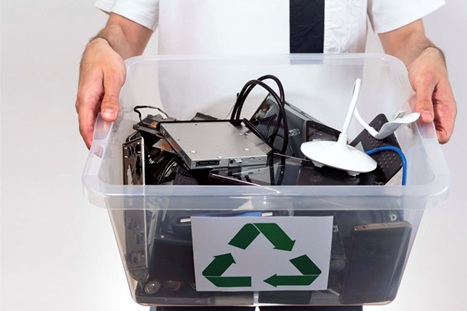(Prelims: Current Affairs)
(Mains, General Studies Paper 3: Conservation, Environmental Pollution and Degradation, Environmental Impact Assessment.) |
Context
The Central Government has launched several schemes to promote electronics and semiconductor manufacturing in India, such as the Electronics Component Manufacturing Scheme and the ₹1,500 crore Mineral Recycling Scheme, which is expected to be implemented in September 2025.

What is E-Waste ?
- E-waste refers to electronic devices and equipment that become inactive or unusable after use.
- Millions of tons of e-waste are generated annually in India, containing precious metals such as gold, silver, and rare earth elements such as lithium, cobalt, and nickel.
Types
- Consumer electronics: smartphones, laptops, tablets, and televisions.
- Household appliances: refrigerators, washing machines, microwaves.
- Industrial equipment: servers, medical devices, and industrial machinery.
- Batteries and accessories: rechargeable batteries, chargers, and cables.
Impact
- Economic potential: Recycling precious metals like copper, aluminum, gold, and lithium from e-waste can reduce India's import dependence.
- Environmental impact: Improper disposal releases toxic substances (such as lead and mercury) into the soil, water, and air, which are harmful to the environment and health.
- Social impact: Workers in the unorganized sector face hazardous conditions.
Steps in the recycling process
- Collection: E-waste is collected from consumers, businesses, or the unorganized sector.
- Classification and separation: Useful metals and non-metals are separated.
- Processing: Chemical and physical processes to extract precious metals (gold, silver, copper) and rare elements (lithium, cobalt).
- Reuse: Extracted materials are used in the production of new electronics.
- Safe Disposal: Non-recyclable materials are disposed of in an environmentally friendly manner.
Recent Reports: Shortcomings in Recycling
- ICEA Report 2023: The Indian Cellular and Electronics Association reported that e-waste recycling is dominated by the unorganized sector, hindering the creation of a circular economy.
- Statistics: In 2022, India generated 4.17 million metric tons of e-waste, of which only one-third was processed through formal channels.
- Paper Trading: Some recyclers exaggerate the amount of recycling to receive incentive payments, a practice known as "paper trading."
- Lack of material traceability: The lack of accurate product inventories in unorganized markets and registered recyclers impacts the recycling process.
Impacts
- Economic losses: The dominance of the unorganized sector leads to underutilization of precious metals, leading to continued dependence on imports.
- Environmental damage: Improper recycling releases toxic substances into the environment.
- Health risks: Workers in the unorganized sector are exposed to hazardous chemicals and unsafe conditions.
- Policy failures: Despite the Extended Producer Responsibility (EPR) framework, implementation gaps remain.
Challenges
- Dominance of the unorganized sector: Unorganized recyclers focus on repairs and parts recovery, not recycling.
- Material traceability: Lack of product lifecycle information, as equipment in India changes hands among multiple owners.
- Non-standardized inventory: State pollution control boards do not use a uniform inventory method, leading to data disparities.
- Limited awareness: Consumers and small recyclers lack awareness about e-waste management.
Way Forward
- Strengthening formal framework: Regular audits of recyclers by the Central Pollution Control Board (CPCB), as initiated with over 50 firms over the past five months, should be further expanded.
- Third-party audits: Mandate independent audits to monitor environmental safety and downstream vendors.
- Material traceability: Create a national database that tracks the lifecycle of products.
- Awareness campaigns: Awareness programs on the benefits of e-waste recycling for consumers and the unorganized sector.
- Policy reforms: Further tighten the EPR framework to ensure manufacturers and recyclers operate responsibly.



